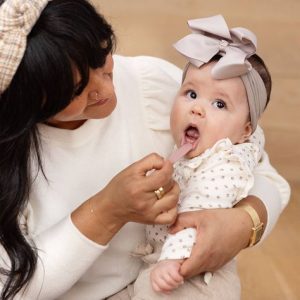Every parent longs to hear their little one’s first words. It’s a magical milestone in a child’s development. But if your toddler seems behind in talking, don’t worry! Here, we’ll explore ways to encourage their communication skills in a fun and natural way.
Understanding Language Development
First, it’s important to understand that language development happens at its own pace. Most toddlers start using single words around 12 months and begin forming simple sentences by age 2. However, there can be variations.
If you have concerns about your toddler‘s speech development, talk to their doctor. They can assess your child’s progress and offer guidance.
Fun Ways to Encourage Talking
Here are some engaging activities you can do with your toddler to stimulate their language skills:
Talk and Sing Throughout the Day
- Narrate your daily activities. “We’re putting on your shoes now. Let’s tie the laces!”
- Sing songs and nursery rhymes together.
- Use simple, clear language.
Make Bath Time a Chat Time
- Splash and play while talking about the water, toys, and sensations.
- Ask your toddler questions about what they like about bath time.
Turn Mealtimes into Learning Times
- Name the foods you’re putting on their plate.
- Encourage your toddler to use gestures and sounds to communicate their needs.
- Describe the tastes and textures of the food.
Read Together Every Day
- Choose age-appropriate books with colorful pictures.
- Point to objects and animals in the book and name them.
- Ask your toddler simple questions about the story.
Playtime is Language Time
- Engage in pretend play with dolls, cars, or stuffed animals.
- Act out stories and encourage your toddler to use their imagination.
- Label the toys you’re using.
Respond to Babbling and Gestures
- Pay attention to your toddler’s attempts to communicate, even if it’s just babbling or gestures.
- Smile and respond with words that build on their sounds or actions.
Make it a Conversation, Not a Lecture
- Talking shouldn’t feel one-sided.
- Get down to your toddler’s eye level and make eye contact.
- Take turns talking and listen patiently to their babbles and sounds.
Creating a Language-Rich Environment
Surround your toddler with a world that encourages communication:
- Limit screen time.
- Label objects in your house.
- Play peek-a-boo and other interactive games.
- Encourage interaction with other children.
The Takeaway: Talking is a Journey
Remember, communication is a journey, not a destination. By incorporating these tips into your daily routine, you can create a fun and stimulating environment that fosters your toddler’s language development.
Most importantly, celebrate every step of the way, from their first babbles to their first words and sentences.
Building on Your Toddler’s Language Skills
It’s fantastic that you’re engaging with your toddler to develop their communication skills! Here are some ways to build on the foundation you’ve created:
Expand on What They Say
- When your toddler uses a single word, try turning it into a short phrase. For example, if they say “juice,” you can say, “Yes, let’s get your juice!”
Ask Open-Ended Questions
- Instead of questions with a yes-or-no answer, ask questions that encourage your toddler to use more words. For example, instead of “Do you want milk?” try “What would you like to drink?”
Repeat and Revoice
- When your toddler uses a new word or phrase, repeat it back to them with excitement. You can also revoice what they’re trying to say using correct grammar.
Make it a Game
- Play simple games that encourage talking, like “I Spy” or “Simon Says.”
Provide Choices
- Offer your toddler choices throughout the day to encourage communication. For example, “Do you want to wear the red shirt or the blue shirt?”
Be Patient and Positive
- Learning to talk takes time. Celebrate your toddler’s efforts and avoid getting frustrated if they get something wrong.
Additional Resources
There are many resources available to help you on your toddler’s communication journey. Here are a few:
- The American Speech-Language-Hearing Association (ASHA): https://www.asha.org/
- Zero to Three: https://www.zerotothree.org/
- The National Institute on Deafness and Other Communication Disorders (NIDCD): https://www.nih.gov/about-nih/what-we-do/nih-almanac/national-institute-deafness-other-communication-disorders-nidcd
Remember, you’re not alone! By talking, singing, reading, and playing with your toddler, you’re creating a nurturing environment that will help their language skills flourish.
When to Seek Additional Support
If you have concerns about your toddler’s speech development, here are some resources that can help:
Pediatrician:
Your pediatrician is a great place to start. They can assess your toddler’s progress and refer you to a speech-language pathologist (SLP) if needed.
Speech-Language Pathologist (SLP):
An SLP is a healthcare professional who specializes in communication development. They can evaluate your toddler’s skills and create a personalized plan to help them progress.
Remember, early intervention is key! If you have any worries, don’t hesitate to talk to your pediatrician.

Enhancing Your Toddler’s Communication Journey
Here are some additional ways to spark your toddler’s language development:
-
Narrate Everyday Routines: Talk through everyday activities like getting dressed, mealtimes, and bath time. Describe objects and actions as you go.
-
Label Everything: Point to objects around the house and name them. This will help your toddler build vocabulary and understand the world around them.
-
Read, Read, Read: Make reading a daily routine. Choose age-appropriate books with colorful pictures and simple stories. Point to objects and ask your toddler questions about the pictures.
-
Embrace Screen Time – Carefully: Limit screen time, but if you do use screens, choose high-quality educational programs. Watch them together and talk about what you see on screen.
-
Sing Songs and Rhymes: Singing is a fun way to introduce new words and rhythms. Plus, it strengthens the bond between you and your toddler.
-
Get Down to Their Level: Make eye contact and kneel down to your toddler’s level when you talk. This will help them focus on you and make communication more engaging.
-
Be Patient and Positive: Learning to talk takes time. Celebrate your toddler’s efforts, no matter how small. Avoid getting frustrated if they make mistakes.
By incorporating these tips and creating a language-rich environment, you’ll be well on your way to fostering your toddler’s communication skills. Remember, the most important thing is to have fun and enjoy this special time together!




